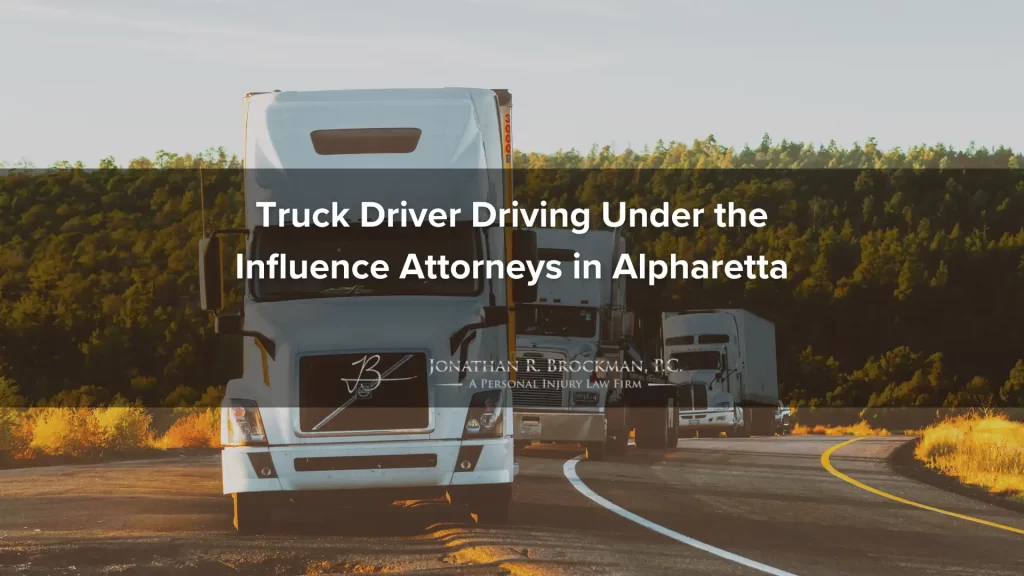
Did you get hurt in an accident because a truck driver was impaired by drugs or alcohol? If so, contact the Alpharetta truck accident attorneys at Jonathan R. Brockman, P.C., and we’ll help you get the financial compensation you deserve through an insurance claim or lawsuit. We’ll fight vigorously for justice and ensure your rights are protected.
With over 30 years of legal experience, our team has the skillset and resources needed to secure a positive outcome for you, so you can put this traumatic experience behind you. Truck accidents are complicated, but we know how to gather the evidence needed to prove fault and develop a solid case. You can depend on us to guide you through the legal process and handle each step so you can focus on recovering and putting this traumatic experience behind you.
Driving under the influence is dangerous and illegal, and you shouldn’t pay for the consequences of someone else’s actions. For help with your DUI truck accident, call Jonathan R. Brockman, P.C. today at 770-205-8887 to schedule a free consultation.
You’re Entitled to Certain Rights After an Impaired Truck Driver Accident
Even when there isn’t alcohol or drugs involved in a motor vehicle crash, the person who caused it automatically becomes financially liable for the victim’s injuries and associated expenses. Under Georgia’s fault system, the at-fault party must pay for any bodily harm or property damage that occurs. Typically, their auto insurance company provides a settlement to cover all costs.
Driving under the influence is a criminal offense, and commercial truck drivers must adhere to an even higher standard than most drivers. A truck driver could get charged with DUI if:
- A chemical test shows a blood alcohol content (BAC) level of .04% or higher (half the .08% limit provided for other drivers), or
- The police officer determines a driver is under the influence of drugs or alcohol.
Even if the truck driver doesn’t get arrested, you can still pursue an insurance claim or civil lawsuit. When you file a liability claim, you can seek up to the limit listed on their policy. Limits compensate accident victims for damages associated with physical injuries and suffering. The minimum required liability limits in Georgia are $25,000 for bodily injury per person and $25,000 for property damage.
However, truck drivers have higher limits since commercial vehicles tend to do more damage than small trucks and compact cars. The minimum recommended limit for intrastate drivers with a vehicle weighing over 10,001 pounds is $750,000. Coverage can go up to $5 million for truck drivers transporting hazardous materials.
What Are Damages?
Damages are all the losses associated with an accident or injury. If you get hurt in a collision with a truck driver, you’ll likely incur various economic and non-economic damages.
Economic damages are actual expenses, such as:
- Medical bills
- Car repair or replacement
- Lost wages
- Lost earning capacity
- Rental car cost
- Out of pocket expenses
Non-economic damages are intangible losses, such as:
- Pain and suffering
- Mental anguish
- Impairment, disfigurement, or disability
- Loss of affection or companionship
Economic and non-economic damages are available in insurance claims and lawsuits. If you choose to file a lawsuit, you could also attempt to seek punitive damages. Instead of compensating your losses, it’s intended as a form of punishment against the at-fault party. It aims to penalize their negligent behavior and deter similar misconduct in the future.
A jury will only award punitive damages if you can provide clear and convincing evidence that the truck driver acted with fraud, malice, willful misconduct, oppression, wantonness, or lack of regard for the consequences of their actions.
Proving Negligence After a Truck Driver Under the Influence Causes an Accident
Filing a civil lawsuit against another person requires following a strict deadline known as a statute of limitations. The statute of limitations in Georgia is two years. That means you have two years from the accident date to sue the truck driver for compensation for your damages. After two years pass, you’ll lose your right to pursue civil action in this matter.
Cases involving someone driving under the influence of alcohol or drugs typically use the legal theory of negligence. Negligence is one party’s failure to exercise a reasonable degree of care to prevent another from harm. Drunk or drugged driving is a clear form of negligence.
Proving negligence in your case requires that you show the following elements existed at the time of the crash:
- Duty: The at-fault truck driver owed you a reasonable duty of care;
- Breach of duty: They at-fault truck driver breached their duty;
- Cause in fact: If it weren’t for their actions, you wouldn’t have gotten hurt;
- Proximate cause: Their breach was the direct cause of your injury; and
- Damages: You incurred damages as a result of the accident.
Jonathan R. Brockman, P.C. has experience proving negligence in cases like yours. We’ll collect vital evidence to show the truck driver was driving under the influence and should accept liability for the resulting harm. We have a dedicated legal team that will work diligently to build a strong case and ensure that the careless driver suffers the consequences of their actions.
What to Do After Sustaining Injuries in an Accident Caused By An Impaired Truck Driver
 When you get hurt in a car crash, it’s an overwhelming experience, and you might not know what to do next. The steps you take in the immediate aftermath could improve your chances of recovering the maximum available compensation. If you’re able to, take the time to investigate the accident scene and follow the steps below to protect yourself and help prove that the truck driver caused your injuries.
When you get hurt in a car crash, it’s an overwhelming experience, and you might not know what to do next. The steps you take in the immediate aftermath could improve your chances of recovering the maximum available compensation. If you’re able to, take the time to investigate the accident scene and follow the steps below to protect yourself and help prove that the truck driver caused your injuries.
Step 1: Call 911. It’s the law to report a crash if it causes an injury, death, or over $500 in property damage. An officer will investigate the scene to determine who was at fault and write a traffic crash report. You can request a copy of it online by completing a form and paying a small fee.
Step 2: If it’s safe to walk around, collect evidence at the crash site. Take photos of vehicle damage, debris, skid marks, and other relevant details. Sometimes evidence is lost during cleanup, so it’s important to capture pictures of everything just in case.
Step 3: Ask the truck driver for their liability insurance details. Also, write down the name and contact information of their employer. Although the driver was impaired, the trucking company could be at fault for the crash if they used negligent hiring practices.
Step 4: Talk to witnesses who saw the collision happen. Write down their names and phone numbers. They might be able to confirm your description of events if the insurance company questions liability.
Step 5: Seek medical attention for the treatment of your injuries. If the doctor refers you to follow up with other providers, follow their orders. Continue attending appointments until you recover or reach maximum medical improvement, which means additional medical intervention won’t improve the injuries.
Step 6: Bring your car to a repair shop or insurance adjuster. Get an estimate to determine the extent of the damage and how much it will cost to fix it.
Step 7: Hire a lawyer from Jonathan R. Brockman, P.C. to help you with your case.
Besides following the above steps, there are some things you should not do during the process of pursuing financial compensation. If you do or say the wrong thing, it could result in a denied insurance claim or low settlement offer. You could lose your rights to the maximum monetary award or miss the opportunity to hold the truck driver accountable for their negligence.
- Don’t admit any amount of fault for the accident. The modified comparative negligence rule diminishes a victim’s damages by the percentage of blame they share. For instance, if you incurred $100,000 in damages but were 20% at fault for the crash, you would only be eligible for a maximum of $80,000 in compensation.
- Don’t dispose of evidence. Even something that seems insignificant, such as bloody clothing, could help prove that you sustained injuries in the crash.
- Don’t talk to the truck driver’s auto insurance company. It’s their job to save money and find a way to deny insurance claims. Anything you say could negatively impact the outcome of your case. Let us handle all communication for you.
- Don’t sign any forms. Insurance companies try to trick accident victims into signing away their rights to the full available liability limits. If you receive any documents in the mail, let us review it first.
- Don’t agree to a recorded statement. You’re under no legal obligation to participate if the at-fault trucker’s insurance company asks.
Jonathan R. Brockman, P.C. Is Ready to Help You Seek Justice
Our team of legal professionals has the experience, knowledge, and resources to seek the monetary award you deserve for the suffering you endured. We know the stress you’re experiencing. When you’re in pain, unable to work, and paying for expensive medical treatment, it creates a financial strain.
We don’t want to add to your burden, which is why we take cases on contingency. That means you don’t have to pay upfront fees to receive legal representation in your case. We don’t collect our legal fees unless we recover financial compensation for our clients. If we don’t win your case, you won’t have to pay us.
If you were the victim of an accident due to a truck driver driving under the influence, call Jonathan R. Brockman, P.C. at 770-205-8887, and let us help you get on the road to recovery.
